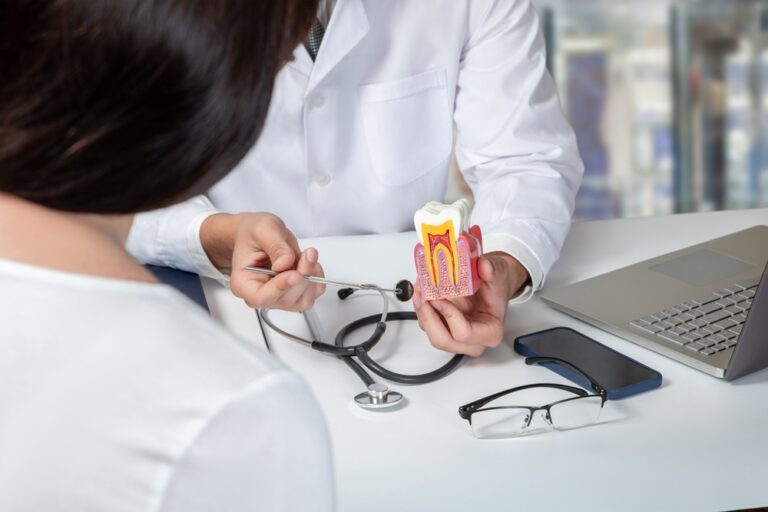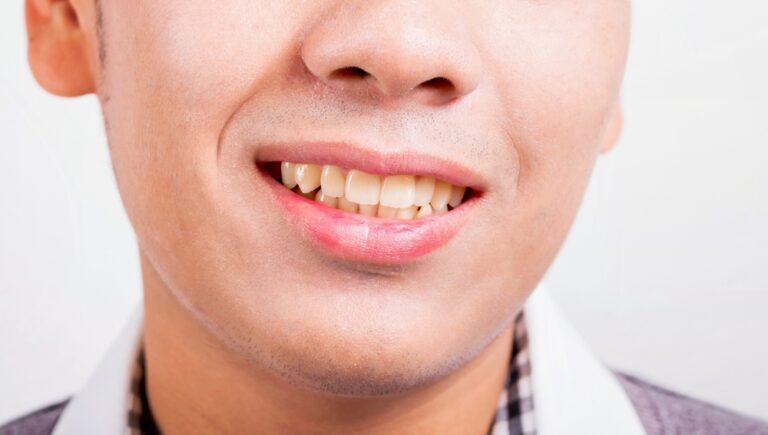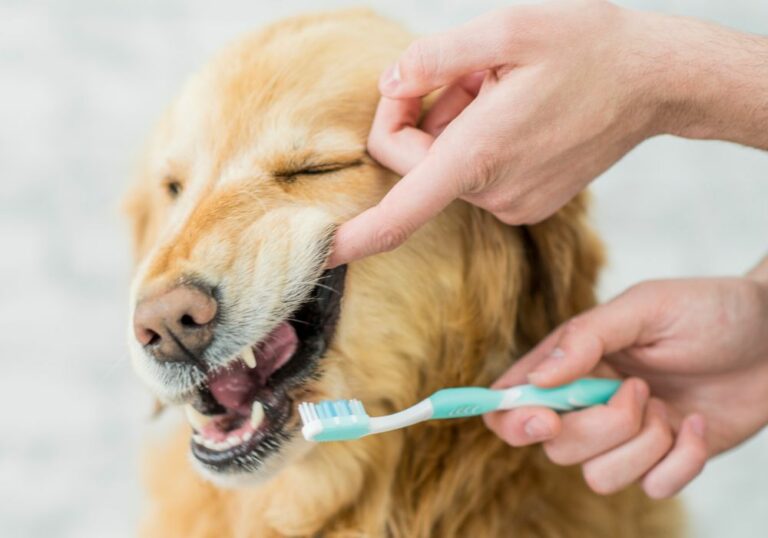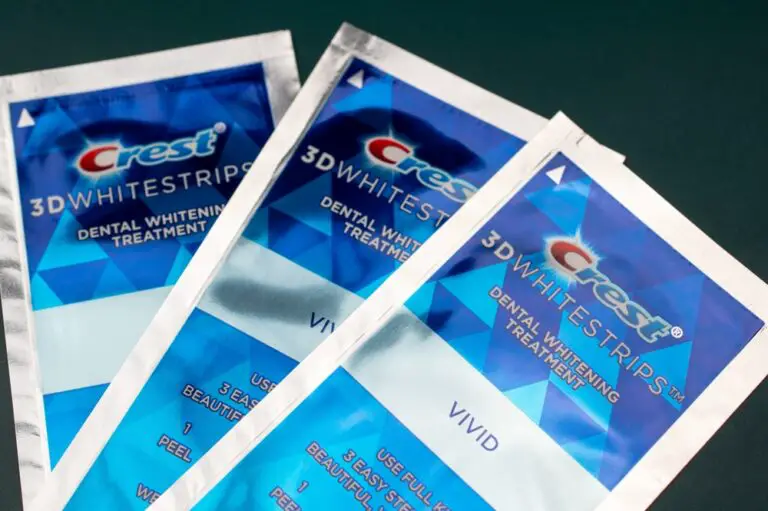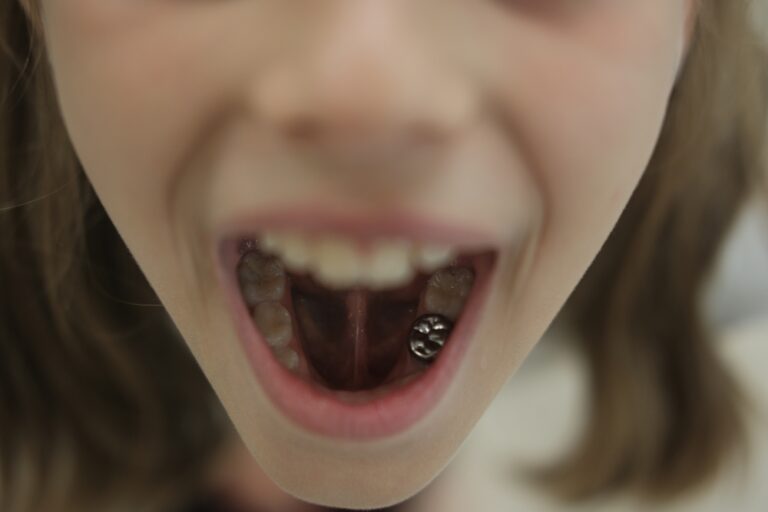If you’re someone who enjoys a cup of coffee or a glass of red wine, you may have noticed that your teeth have become stained over time. One way to combat this is by using teeth whitening products, which typically use hydrogen peroxide or carbamide peroxide to dissolve stains. However, you may be wondering if these products can damage your teeth in the process.
While teeth whitening products can be effective at removing stains, they do have the potential to cause damage if not used properly. For example, whitening strips that contain bleaching ingredients like hydrogen peroxide can cause damage to your teeth’s enamel and dentin if used too frequently or for too long. Additionally, some people may experience tooth sensitivity or gum irritation after using these products.
It’s important to note that not all teeth whitening products are created equal, and some may be safer for your teeth than others. Before using any whitening product, it’s a good idea to talk to your dentist to determine which option is best for you. By following the instructions carefully and using the product as directed, you can safely and effectively whiten your teeth without causing any damage.
Understanding Bleach
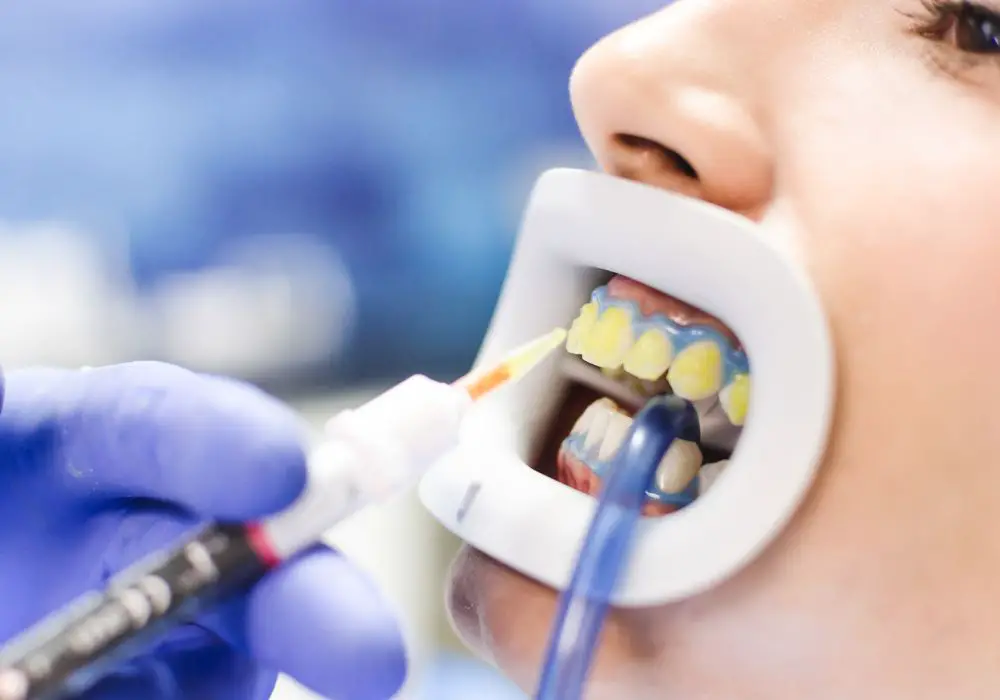
Bleach is a common ingredient in teeth whitening products. It is a chemical agent that removes stains and discoloration from teeth. There are two types of bleach used in teeth whitening: hydrogen peroxide and carbamide peroxide.
Hydrogen peroxide is a powerful bleaching agent that penetrates the enamel of the tooth to break down stains. It is commonly used in professional teeth whitening treatments. Carbamide peroxide is a slower-acting bleach that breaks down into hydrogen peroxide over time. It is commonly used in at-home teeth whitening kits.
While bleach can be effective at removing stains and discoloration from teeth, it can also cause damage if used improperly. Overuse of bleach can lead to tooth sensitivity, gum irritation, and even enamel erosion.
It is important to follow the instructions provided with your teeth whitening product and to use it as directed. If you experience any discomfort or sensitivity, stop using the product immediately and consult with your dentist.
In addition to using teeth whitening products, there are other steps you can take to keep your teeth looking their best. Brushing twice a day, flossing daily, and avoiding foods and drinks that can stain your teeth can all help to maintain a bright, healthy smile.
Bleach and Oral Health
Bleaching is a popular method of teeth whitening that can help you achieve a brighter, more confident smile. However, it’s important to be aware of the potential risks of using bleach on your teeth. Here are some things you should know about bleach and oral health:
- Bleach can damage your tooth enamel: The peroxide-based bleaching agents used in many tooth whitening products can weaken your tooth enamel, making it more susceptible to decay and other oral health problems. If you use bleach too often or leave it on your teeth for too long, it can cause permanent damage to your enamel.
- Bleach can cause tooth sensitivity: Many people experience increased tooth sensitivity after using bleach. This can make it painful to eat or drink hot or cold foods and beverages. If you have sensitive teeth, you may want to consider other teeth whitening options or talk to your dentist about ways to minimize sensitivity.
- Bleach can irritate your gums: If bleach comes into contact with your gums, it can cause irritation and inflammation. This can lead to gum recession and other oral health problems. It’s important to follow the instructions carefully and avoid getting bleach on your gums.
- Bleach is not recommended for everyone: If you have certain dental conditions, such as cavities or gum disease, you may not be a good candidate for teeth whitening with bleach. Your dentist can help you determine whether bleach is a safe and effective option for you.
Overall, bleach can be an effective way to whiten your teeth, but it’s important to use it carefully and under the guidance of a dental professional. Be sure to follow the instructions carefully and talk to your dentist if you experience any side effects or have concerns about using bleach on your teeth.
Scientific Studies on Bleach and Teeth
Teeth whitening is a popular cosmetic dental procedure that involves using bleach to remove stains and discoloration from the teeth. However, there has been some concern about whether or not bleach can damage the teeth. Here, we’ll take a closer look at what scientific studies have to say about the effects of bleach on teeth.
One study published in the Journal of the American Dental Association found that when used according to manufacturer instructions, over-the-counter whitening products containing hydrogen peroxide or carbamide peroxide were safe and effective for whitening teeth. However, the study did note that some people may experience tooth sensitivity or gum irritation as a side effect of using these products.
Another study published in the Journal of Endodontics looked at the effects of hydrogen peroxide on the hardness and surface roughness of tooth enamel. The study found that while hydrogen peroxide did cause some softening of the enamel, this effect was temporary and did not cause any long-term damage to the teeth.
A review of the scientific literature on teeth whitening published in the Journal of Esthetic and Restorative Dentistry concluded that while teeth whitening can cause some temporary side effects like tooth sensitivity and gum irritation, it is generally safe and effective when used according to manufacturer instructions.
Overall, the scientific evidence suggests that when used properly, bleach-based teeth whitening products are generally safe and effective for whitening teeth. However, it’s important to follow the instructions carefully and talk to your dentist if you experience any side effects.
Potential Risks of Using Bleach on Teeth
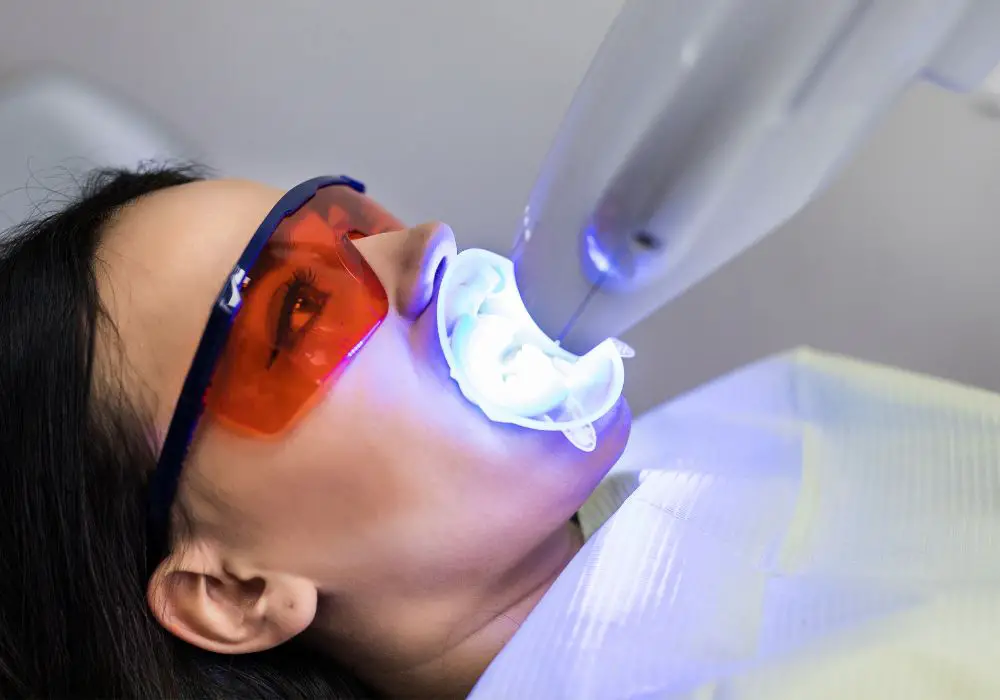
When it comes to teeth whitening, bleach is a common ingredient used in many products. While it can effectively remove stains and brighten teeth, there are potential risks associated with using bleach on your teeth. Here are some things to keep in mind:
Enamel Erosion
Bleaching agents like hydrogen peroxide can cause damage to the enamel, the outer layer of your teeth. Overuse or misuse of bleach can cause the enamel to erode, which can lead to tooth sensitivity, discoloration, and even cavities. It’s important to follow the instructions carefully and not use bleach too frequently.
Gum Irritation
Bleach can also irritate your gums if it comes into contact with them. This can cause redness, swelling, and discomfort. To avoid gum irritation, it’s important to use a whitening product that fits properly and doesn’t allow the bleach to come into contact with your gums. If you do experience gum irritation, stop using the product and talk to your dentist.
Tooth Sensitivity
One of the most common side effects of using bleach on your teeth is tooth sensitivity. This can occur when the bleach penetrates the enamel and reaches the dentin layer beneath. The dentin contains tiny tubules that lead to the nerve of the tooth, which can cause pain and discomfort when exposed to hot or cold temperatures. If you experience tooth sensitivity, try using a toothpaste designed for sensitive teeth and avoid using bleach for a while.
In summary, while bleach can be an effective way to whiten your teeth, it’s important to be aware of the potential risks. Enamel erosion, gum irritation, and tooth sensitivity are all possible side effects of using bleach on your teeth. Be sure to follow the instructions carefully and talk to your dentist if you experience any problems.
Safe Alternatives to Bleach for Teeth Whitening
If you’re looking to whiten your teeth but are concerned about the potential damage that bleach can cause, there are plenty of safe alternatives available. Here are some options to consider:
Professional Whitening Treatments
Professional whitening treatments are a safe and effective way to whiten your teeth. Your dentist can use a variety of methods to whiten your teeth, including:
- In-office bleaching procedures
- Custom-fitted trays with professional strength whitening gel
- Light-activated whitening treatments
These treatments are generally more expensive than at-home options, but they are also more effective and longer-lasting. Your dentist can also monitor your progress and ensure that your teeth and gums remain healthy throughout the process.
At-Home Whitening Kits
If you prefer to whiten your teeth at home, there are plenty of safe options available. Look for products that have been approved by the American Dental Association (ADA) and follow the instructions carefully.
Some safe at-home whitening options include:
- ADA-approved whitening strips
- ADA-approved whitening toothpaste
- Custom-fitted trays with over-the-counter whitening gel
It’s important to note that at-home whitening kits may not be as effective as professional treatments, and they may take longer to achieve desired results. However, they are generally more affordable and convenient.
Natural Teeth Whitening Methods
If you prefer to avoid chemical-based whitening products altogether, there are several natural methods you can try. These methods may not be as effective as bleach or other chemical-based products, but they are generally safe and gentle on your teeth and gums.
Some natural teeth whitening methods include:
- Brushing with baking soda
- Oil pulling with coconut oil
- Eating crunchy fruits and vegetables, like apples and carrots
It’s important to note that natural teeth whitening methods may take longer to achieve desired results, and they may not be as effective as other options. However, they are generally safe and gentle on your teeth and gums.
Preventing Tooth Discoloration
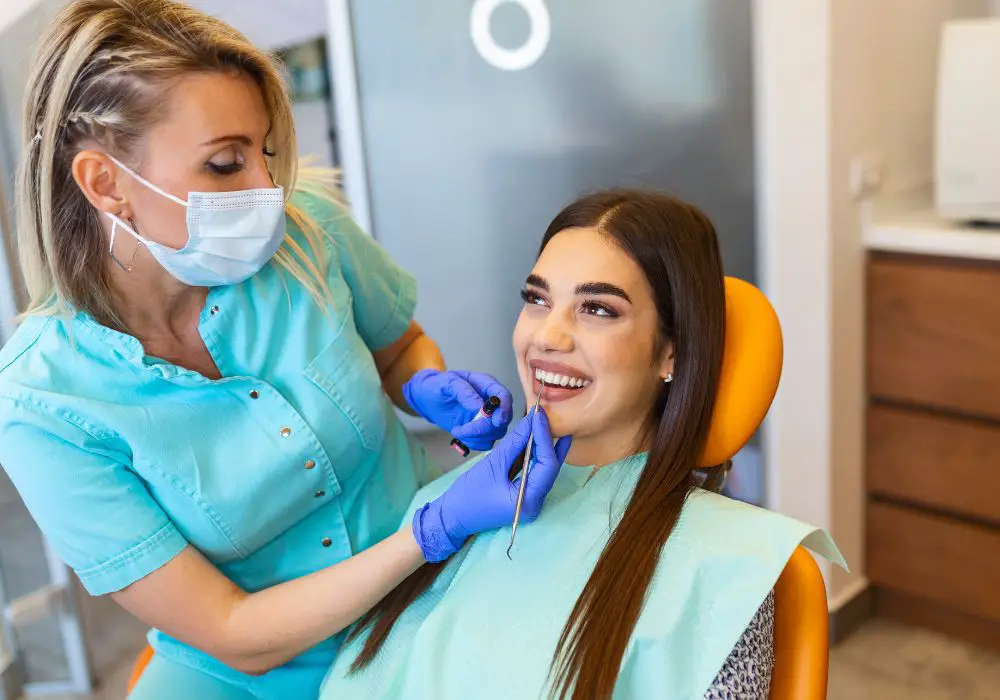
Tooth discoloration is a common problem that can affect anyone. Fortunately, there are several ways to prevent tooth discoloration and keep your teeth looking healthy and bright.
Proper Oral Hygiene
One of the most important ways to prevent tooth discoloration is by practicing good oral hygiene. This includes brushing your teeth twice a day with fluoride toothpaste, flossing at least once a day, and visiting your dentist regularly for cleanings and checkups.
Brushing and flossing help remove plaque and food particles that can cause stains on your teeth. Regular dental cleanings can also remove surface stains and keep your teeth looking their best.
Diet and Lifestyle Choices
Your diet and lifestyle choices can also affect the color of your teeth. Certain foods and drinks, such as coffee, tea, red wine, and berries, can stain your teeth over time. Smoking and using other tobacco products can also cause tooth discoloration.
To prevent tooth discoloration, it’s important to limit your intake of these staining foods and drinks. You can also try drinking through a straw to minimize contact with your teeth.
Eating a healthy diet rich in fruits and vegetables can also help keep your teeth healthy and bright. Crunchy fruits and vegetables, such as apples and carrots, can help scrub away surface stains and promote saliva production, which helps neutralize acid and protect your teeth.
In addition to these steps, you can also consider using whitening toothpaste or mouthwash to help remove surface stains and keep your teeth looking their best. However, it’s important to talk to your dentist before using any whitening products, as they can cause sensitivity or other side effects if used improperly.
By practicing good oral hygiene and making smart diet and lifestyle choices, you can help prevent tooth discoloration and keep your smile looking bright and healthy.
Frequently Asked Questions
Is it safe to use household bleach on teeth?
No, it is not safe to use household bleach on teeth. Household bleach contains a high concentration of sodium hypochlorite, which can cause chemical burns and irritation to the gums and soft tissues in your mouth. It can also damage the enamel on your teeth, leading to sensitivity and discoloration.
What are the long-term side effects of teeth whitening?
Long-term side effects of teeth whitening can include increased tooth sensitivity and gum irritation. Overuse of teeth whitening products can also lead to enamel erosion and damage to the underlying dentin layer of your teeth. It is important to follow the instructions for any teeth whitening product and to consult with your dentist before starting any whitening regimen.
Can too much teeth whitening damage teeth?
Yes, too much teeth whitening can damage teeth. Overuse of teeth whitening products can lead to enamel erosion and damage to the underlying dentin layer of your teeth. It is important to follow the instructions for any teeth whitening product and to consult with your dentist before starting any whitening regimen.
Can hydrogen peroxide be used to bleach teeth?
Yes, hydrogen peroxide can be used to bleach teeth. It is a common ingredient in many teeth whitening products and works by breaking down stains and discoloration on the surface of your teeth. However, it is important to use hydrogen peroxide in moderation and to follow the instructions for any whitening product.
Does LED teeth whitening harm enamel?
No, LED teeth whitening does not harm enamel. LED teeth whitening uses a blue light to activate the whitening gel, which does not damage the enamel on your teeth. However, overuse of any teeth whitening product can lead to enamel erosion and damage to the underlying dentin layer of your teeth.
Does teeth bleaching weaken enamel?
Yes, teeth bleaching can weaken enamel. Overuse of teeth bleaching products can lead to enamel erosion and damage to the underlying dentin layer of your teeth. It is important to follow the instructions for any teeth bleaching product and to consult with your dentist before starting any bleaching regimen.

